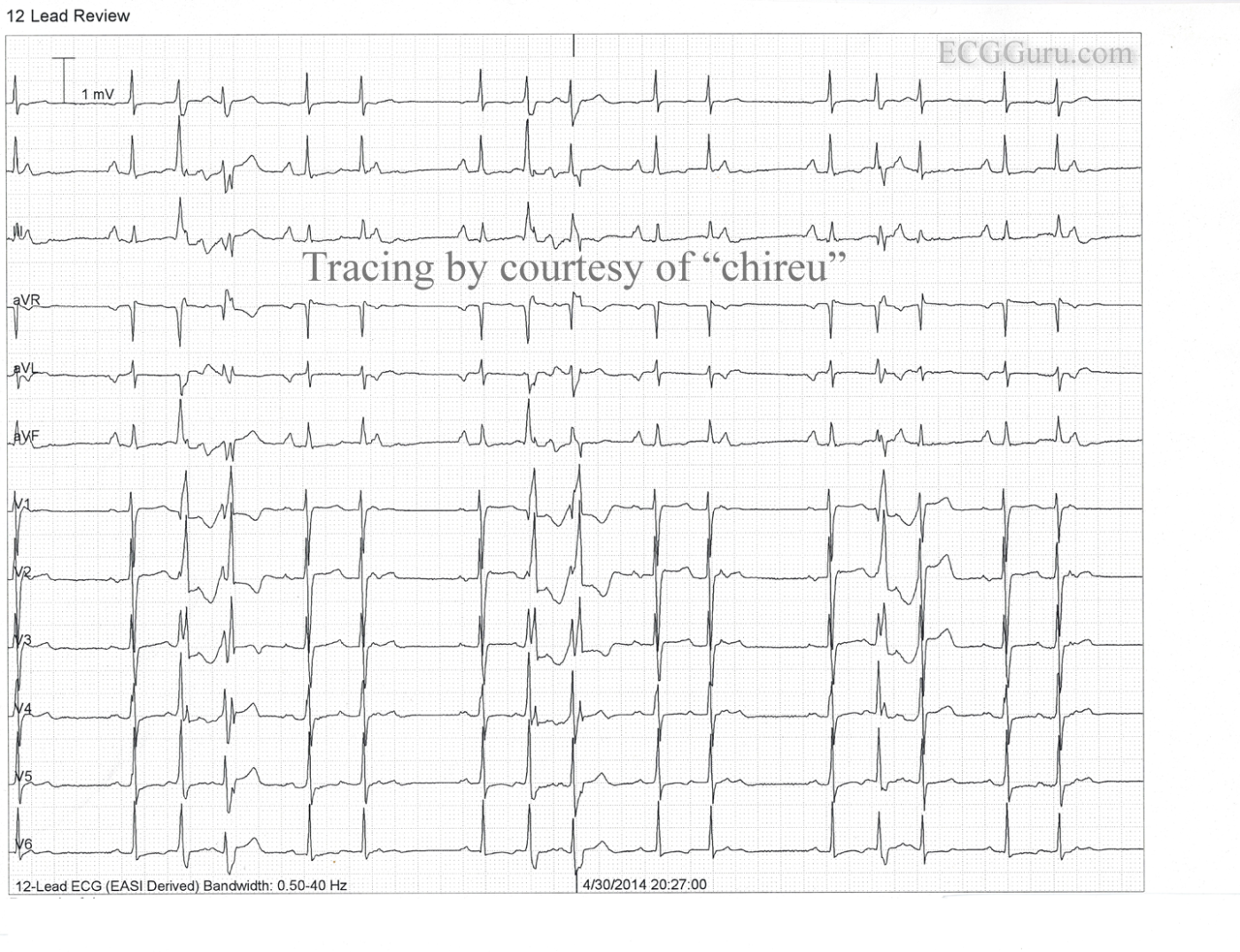Submitted by jer5150 on Wed, 07/09/2014 - 16:33
This is a derived (i.e., EASI) 12-lead ECG donated to the ECG Guru by new member "chireu". The only history they were able to provide was one of possible atrial flutter but that was uncertain. How would you interpret this ECG?
Rate this content:
-

- jer5150's blog
- Log in or register to post comments
All our content is FREE & COPYRIGHT FREE for non-commercial use
Please be courteous and leave any watermark or author attribution on content you reproduce.



Comments
FUN ECG
Sinus PVC pairs SVPB, BPAC, Large P Waves.
ecg
Mobitz Type II with right bundle branch block
just a guess
looks like complete HB from lead II
with PJC's
after printing the ecg, I can only see a sinus rythum rate about 60 with PJC possiby blocking the regular P wave..
I am just starting to get the
I am just starting to get the more advanced 12 Lead info. In this 12 lead I can see and march the P waves through leads II and III. Everyother one of them appears to have an asociated QRS complex. The rythm seems to be a cycle of 5 beats. The sinus beat, two wide early beats, then the sinus beat again and then what appears to be a PJC. The QRS beats asociated with the P waves can be marched out.
Nancy
Strange pattern repeating
Beat #1 = sinus beat
Beat #2 = interpolated PVC
Beat # 3 = sinus beat conducting with RBBB type aberrancy due to the lack of a pause from the interpolated PVC
Beat # 4 = sinus beat
Beat # 5 = junctional beat dissociated from the sinus P wave which follows the QRS
Then this bizarre sequence of beats repeats 2 more times. I think.
Walter A. Mueller, CCT, CRAT
interesting case--just a guess
interesting tracing~~
sinus P waves can be seen marching as the baseline
the 1st and 4th QRS complex seem to be conducted from the sinus P
the 2nd QRS looks like a interpolated VPC, which does not interfere the sinus P wave from conducting but however causes prolonged unrefractory period
resulting in an aberrant conduction as seen in 3rd QRS
the 5th QRS might be a usurpassed junctional beat
the whole group repeats
just some guess
thank you!!
1. A sinus p wave with
1. A sinus p wave with right atrial enlargement followed by a premature junctional beat conducted with RBBB aberrancy and retrograde conduction to the atria. The third complex is also conducted with RBBB aberrancy. The P wave of third complex is a fusion p wave (sinus + retrograde) and this third complex may be defined as a reciprocal beat.
2. Sinus beat (all sinus beats are conducted with first degree AV block)
3. Junctional beat
4. Sinus beat
5. Premature junctional beat with RBBB aberrancy followed by a reciprocal beat
6. Sinus beat
7. Junctional beat
8. Sinus beat
9. Premature junctional beat with RBBB aberrancy
10. Sinus beat (conducted sinus p distorts T wave)
And the tracing ends with:
11. Sinus beat
12. Junctional beat
In addition, I think the primary problem here is the accelerated Junctional rhythm which causes AV dissociation by usurpation and some of these junctional beats conducted aberrantly depending on their coupling interval with the sinus beats. Thank you!
zafer karabulut
His-bundle VEBs
Sinus rhythm
Main-stem extrasystoles, some interpolated, tending to allorhythmia
Phasic aberrant conduction in both extrasystolic and sinus beats (following interpolation)
Non-spectific T wave changes
Sorry to have duplicated the
Sorry to have duplicated the comment.